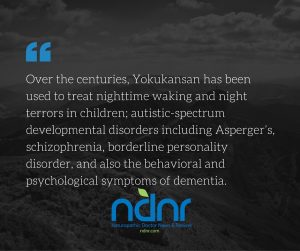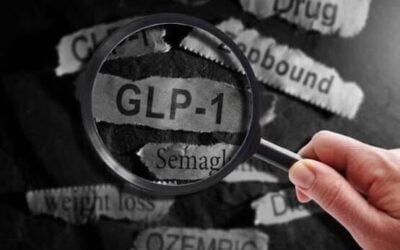Jillian Stansbury, ND
With Alzheimer’s disease and other forms of dementia affecting millions of elders, the need for safe remedies to both halt the progression and help treat symptoms is greater than ever before. One of the greatest challenges for caregivers and family members of patients with cognitive impairment is handling aggression and other disturbing behavioral issues that accompany memory loss in approximately 90% of dementia patients. One traditional remedy that is used for aggression is Yokukansan, a Kampo remedy, which is the traditional herbal system of Japan.
Yokukansan
Yokukansan was introduced to the Kampo system as early as the Ming dynasty in 1555, by Xue Kai and Xue Ji, as a remedy for restlessness and agitation in children; however, it existed for at least 1000 years prior to this in Traditional Chinese Medicine. Also known as Yi-Gan San (抑肝散) in China, the formula contains powdered herbs: 4 parts Atractylodis lanceae root, 4 parts Poria, 3 parts Cnidium root, 3 parts Uncaria uncis cum ramulus, 3 parts Angelica root, 3 parts Bupleurum root, and 1.5 parts Glycyrrhiza root, all blended and dosed at 2.5 grams TID. The Kampo medical system persists in modern times and is commonly employed by licensed physicians who dispense formulas as concentrated powders. Yokukansan is approved by the Japanese Ministry of Health, covered under the National Health Insurance plan, and was recommended by the Japanese Society of Neurology in 2010 for the management of dementia symptoms.1,2
Over the centuries, the formula has been used to treat nighttime waking and night terrors in children; autistic-spectrum developmental disorders including Asperger’s; aggression, tantrums, impulsivity, screaming attacks, self-injury, and irritability; schizophrenia; borderline personality disorder; Charles Bonnet syndrome; Parkinson’s disease; pervasive developmental disorder; neuroleptic drug-induced tardive dyskinesia; Huntington’s disease; restless leg syndrome; neurosis; insomnia; sleep tremors; and the behavioral and psychological symptoms of dementia.3,4
A Cochrane meta-analysis reported Yokukansan to improve neuropsychiatric symptoms and daily living scores in dementia patients, and without toxicity or significant side effects.5 Several clinical trials examining Alzheimer’s and dementia patients have shown a statistically significant improvement in agitation, aggression, and hallucination, again without adverse events.6-9 One randomized, multicenter, double-blind, placebo-controlled study investigated the effects of Yokukansan on 120 schizophrenic patients from 34 psychiatric hospitals in Japan, who had responded poorly to other anti-psychotic medications.10 While the formula was not superior to placebo in terms of cognitive improvements, statistically significant improvements were seen in hostility and excitability compared to placebo.10 A similar study reported efficacy in reducing behavioral symptoms in schizophrenics.11 Several clinical studies have shown improvement in irritability, agitation, and hyperactivity in children with pervasive developmental disorders.12,13 One clinical trial of 20 patients with Charles Bonnet syndrome (the triad of complex visual hallucination associated with ocular pathology causing visual deterioration, but with preserved cognitive status) reported Yokukansan to significantly reduce visual hallucinations within 2 to 4 weeks.14
Mechanisms of Action
Although the herbal combination would contain hundreds, if not thousands, of “active” constituents, some of Yokukansan’s activity has been credited to 18β-glycyrrhetinic acid in licorice and to geissoschizine methyl ether in Uncaria15,16; both are shown to be well absorbed orally and to be detectible in the plasma within 0.5 to 1 hour following ingestion.17 Animal studies have demonstrated neuroprotective effects,18 serotonin (5-HT) and dopamine agonism,10,19,20 GABAergic effects,22 and glutamate-receptor blockade.23 Yokukansan significantly increases the density of serotonin receptors in the prefrontal cortex,24 and Uncaria and its constituent, geissoschizine methyl ether, has a partial agonistic effect on 5-HT(1A) receptors and is believed to contribute to the anti-aggressive effects of the formula.24,25
Cognitive and memory-enhancing effects have been demonstrated in animals, an effect reversed by the use of muscarinic-receptor antagonists27 [suggesting that Yokukansan may have cholinergic effects]. Yokukansan may protect functional neurons from the degenerative effects of β-amyloid accumulation,28 as does isolated Uncaria.29 Yokukansan significantly increases high-potassium-evoked potentiation of acetylcholine release, and ameliorates spatial memory impairment in a rat model of early-phase Alzheimer’s disease.30 Yokukansan also attenuates morphine tolerance and naloxone-precipitated morphine withdrawal symptoms without diminishing analgesic effects in animal studies, with effects credited to 18β-glycyrrhetinic acid and geissoschizine methyl ether’s ability to reduce expression of α(2A)-adrenoceptor in the brainstem.31
Safety
Although the formula is very well tolerated and meta-analyses have reported few side effects, there are isolated reports of severe hypokalemia, perhaps due to the licorice component.32 Pseudoaldosteronism is a known side effect of high doses of licorice, and although the amount is low in Yokukansan, genetic variations in the 12β-hydroxysteroid enzyme may leave some people susceptible to hypokalemia-related hypertension. To be on the safe side, potassium supplementation and/or routine testing of serum potassium may be prudent when using the formula.33 Numerous clinical trials on patients with dementia-related behavioral disorders have reported significant decreases in hallucinations, agitation, anxiety, irritability, aggression, tension, depressive mood, hostility, suspiciousness, motor retardation, uncooperativeness, and excitability with Yokukansan, without observed or laboratory side effects,32-39 and only 1 study reported 2 cases of hypokalemia.40
Table 1. The 7 Herbs in the Yokukansan Formula
| Scientific Name | Chinese Name | Common Names | Medicinal Component Used |
| Bupleurum | Chai Hu 柴胡 | Hare’s ear root, Thorowax root | Roots |
| Poria cocos | Fu Ling 茯苓 | Sclerotium of tuckahoe, China root, hoelen, Indian bread | Woody mushroom / fruiting body |
| Cnidium officinale or Ligusticum chaunxiong | Japanese Chuan Xiong 川芎 (Cnidium) | Sichuan lovage root (Ligusticum) | Rhizomes |
| Glycyrrhiza glabra | Gan Cao 甘草 | Licorice root | |
| Angelica sinensis | Dong Quai, Dang Gui 當歸 | Tang kuei | Roots |
| Uncaria cum-uncis | Gou Teng 芶藤 | Stems of gambir vine, gambir, uncaria vine | Vine bark |
| Atractylodis | Cang Zhu 蒼术 | Rhizomes |
 Jillian Stansbury, ND, has practiced in SW Washington for nearly 20 years, specializing in women’s health, mental health, and chronic disease. She holds undergraduate degrees in medical illustration and medical assisting, and graduated with honors in both programs. Dr Stansbury also chaired the botanical medicine program at NCNM and has taught the core botanical curricula for more than 20 years. In addition, Dr Stansbury writes and serves as a medical editor for numerous professional journals and lay publicans, plus teaches natural products chemistry and herbal medicine around the country. At present, she is working to set up a humanitarian service organization in Peru and studying South American ethnobotany. She is the mother of 2 adult children, and her hobbies include art, music, gardening, camping, international travel, and the study of quantum and metaphysics.
Jillian Stansbury, ND, has practiced in SW Washington for nearly 20 years, specializing in women’s health, mental health, and chronic disease. She holds undergraduate degrees in medical illustration and medical assisting, and graduated with honors in both programs. Dr Stansbury also chaired the botanical medicine program at NCNM and has taught the core botanical curricula for more than 20 years. In addition, Dr Stansbury writes and serves as a medical editor for numerous professional journals and lay publicans, plus teaches natural products chemistry and herbal medicine around the country. At present, she is working to set up a humanitarian service organization in Peru and studying South American ethnobotany. She is the mother of 2 adult children, and her hobbies include art, music, gardening, camping, international travel, and the study of quantum and metaphysics.
References
- Okamoto H, Iyo M, Ueda K, et al. Yokukan-san: a review of the evidence for use of this Kampo herbal formula in dementia and psychiatric conditions. Neuropsychiatr Dis Treat. 2014;10:1727-1742.
- Teranishi M, Kurita M, Nishino S, et al. Efficacy and tolerability of risperidone, yokukansan, and fluvoxamine for the treatment of behavioral and psychological symptoms of dementia: a blinded, randomized trial. J Clin Psychopharmacol. 2013;33(5):600-607.
- Satoh T, Takahashi T, Iwasaki K, et al. Traditional Chinese medicine on four patients with Huntington’s disease. Mov Disord. 2009;24(3):453-455.
- Horiguchi J. Clinical usage of Yi-gan san-schizophrenia, borderline personality disorder, dyskinesia etc. Seishin Shinkeigaku Zasshi. 2012;114(6):708-718.
- Matsuda Y, Kishi T, Shibayama H, Iwata N. Yokukansan in the treatment of behavioral and psychological symptoms of dementia: a systematic review and meta-analysis of randomized controlled trials. Hum Psychopharmacol. 2013;28(1):80-86.
- Furukawa K, Tomita N, Uematsu D, et al. Randomized double-blind placebo-controlled multicenter trial of Yokukansan for neuropsychiatric symptoms in Alzheimer’s disease. Geriatr Gerontol Int. 2015 Dec 29. doi: 10.1111/ggi.12696. [Epub ahead of print]
- Sumiyoshi H, Mantani A, Nishiyama S, et al. Yokukansan treatment of chronic renal failure patients receiving hemodialysis, with behavioral and psychological symptoms of dementia: an open-label study. Am J Geriatr Psychiatry. 2013;21(11):1082-1085.
- Iwasaki K, Kosaka K, Mori H, et al. Improvement in delusions and hallucinations in patients with dementia with Lewy bodies upon administration of yokukansan, a traditional Japanese medicine. 2012;12(4):235-241.
- Nagata K, Yokoyama E, Yamazaki T, et al. Effects of yokukansan on behavioral and psychological symptoms of vascular dementia: an open-label trial. 2012;19(6):524-528.
- Miyaoka T, Furuya M, Horiguchi J, et al. Efficacy and safety of yokukansan in treatment-resistant schizophrenia: a randomized, double-blind, placebo-controlled trial (a Positive and Negative Syndrome Scale, five-factor analysis). Psychopharmacology (Berl). 2015;232(1):155-164.
- Miyaoka T, Furuya M, Yasuda H, et al. Yi-gan san as adjunctive therapy for treatment-resistant schizophrenia: an open-label study. Clin Neuropharmacol. 2009;32(1):6-9.
- Wake R, Miyaoka T, Inagaki T, et al. Yokukansan (TJ-54) for irritability associated with pervasive developmental disorder in children and adolescents: a 12-week prospective, open-label study. J Child Adolesc Psychopharmacol. 2013;23(5):329-336.
- Miyaoka T, Wake R, Furuya M, et al. Yokukansan (TJ-54) for treatment of pervasive developmental disorder not otherwise specified and Asperger’s disorder: a 12-week prospective, open-label study. BMC Psychiatry. 2012;12:215.
- Miyaoka T, Furuya M, Kristian L, et al. Yi-gan san for treatment of charles bonnet syndrome (visual hallucination due to vision loss): an open-label study. Clin Neuropharmacol. 2011;34(1):24-27.
- Matsumoto K, Zhao Q, Niu Y, et al. Kampo formulations, chotosan, and yokukansan, for dementia therapy: existing clinical and preclinical evidence. J Pharmacol Sci. 2013;122(4):257-269.
- Kanno H, Kawakami Z, Iizuka S, et al. Glycyrrhiza and Uncaria Hook contribute to protective effect of traditional Japanese medicine yokukansan against amyloid β oligomer-induced neuronal death. J Ethnopharmacol. 2013;149(1):360-370.
- Kitagawa H, Munekage M, Ichikawa K, et al.Pharmacokinetics of Active Components of Yokukansan, a Traditional Japanese Herbal Medicine after a Single Oral Administration to Healthy Japanese Volunteers: A Cross-Over, Randomized Study. PLoS One. 2015;10(7):e0131165.
- Nakatani Y, Tsuji M, Amano T, et al. Neuroprotective effect of yokukansan against cytotoxicity induced by corticosterone on mouse hippocampal neurons. 2014;21(11):1458-1465.
- Kung FC, Ishii R, Liu HC, Takeda M. New possibility of traditional Chinese and Japanese medicine as treatment for behavioral and psychiatric symptoms in dementia. Clin Interv Aging. 2012;7:393-396.
- Yamaguchi T, Tsujimatsu A, Kumamoto H, et al. Anxiolytic effects of yokukansan, a traditional Japanese medicine, via serotonin 5-HT1A receptors on anxiety-related behaviors in rats experienced aversive stress. J Ethnopharmacol. 2012;143(2):533-539.
- Kamei J, Miyata S, Ohsawa M. Involvement of the benzodiazepine system in the anxiolytic-like effect of Yokukansan (Yi-gan san). Prog Neuropsychopharmacol Biol Psychiatry. 2009;33(8):1431-1437.
- Takeda A, Iwaki H, Ide K, et al. Therapeutic effect of Yokukansan on social isolation-induced aggressive behavior of zinc-deficient and pair-fed mice. Brain Res Bull. 2012;87(6):551-555.
- Ueki T, Mizoguchi K, Yamaguchi T, et al. Yokukansan, a traditional Japanese medicine, decreases head-twitch behaviors and serotonin 2A receptors in the prefrontal cortex of isolation-stressed mice. J Ethnopharmacol. 2015;166:23-30.
- Nishi A, Yamaguchi T, Sekiguchi K, et al. Geissoschizine methyl ether, an alkaloid in Uncaria hook, is a potent serotonin ₁A receptor agonist and candidate for amelioration of aggressiveness and sociality by yokukansan. Neuroscience. 2012;207:124-136.
- Terawaki K, Ikarashi Y, Sekiguchi K, et al. Partial agonistic effect of yokukansan on human recombinant serotonin 1A receptors expressed in the membranes of Chinese hamster ovary cells. J 2010;127(2):306-312.
- Yamada M, Hayashida M, Zhao Q, et al. Ameliorative effects of yokukansan on learning and memory deficits in olfactory bulbectomized mice. J Ethnopharmacol. 2011;135(3):737-746.
- Kanno H, Kawakami Z, Iizuka S, et al. Glycyrrhiza and Uncaria Hook contribute to protective effect of traditional Japanese medicine yokukansan against amyloid β oligomer-induced neuronal death. J Ethnopharmacol. 2013;149(1):360-370.
- Fujiwara H, Takayama S, Iwasaki K, et al. Yokukansan, a traditional Japanese medicine, ameliorates memory disturbance and abnormal social interaction with anti-aggregation effect of cerebral amyloid β proteins in amyloid precursor protein transgenic mice. 2011;180:305-313.
- Uchida N, Takasaki K, Sakata Y, N et al. Cholinergic involvement and synaptic dynamin 1 expression in Yokukansan-mediated improvement of spatial memory in a rat model of early Alzheimer’s disease. Phytother Res. 2013;27(7):966-972.
- Nakagawa T, Nagayasu K, Nishitani N, et al. Yokukansan inhibits morphine tolerance and physical dependence in mice: the role of α₂A-adrenoceptor. 2012;227:336-349.
- Nishiyama N, Takeshita M, Tanaka K, et al. A case of severe hypokalemia caused by a Chinese herbal remedy (Yokukansan) in an 81-year-old woman with dementia. [Article in Japanese] Nihon Ronen Igakkai Zasshi. 2011;48(5):553-557.
- Hayashi Y, Ishida Y, Inoue T, et al. Treatment of behavioral and psychological symptoms of Alzheimer-type dementia with Yokukansan in clinical practice. Prog Neuropsychopharmacol Biol Psychiatry. 2010;34(3):541-545.
- Kawanabe T, Yoritaka A, Shimura H, et al. Successful treatment with Yokukansan for behavioral and psychological symptoms of Parkinsonian dementia. Prog Neuropsychopharmacol Biol Psychiatry. 2010;34(2):284-287.
- Okahara K, Ishida Y, Hayashi Y, et al. Effects of Yokukansan on behavioral and psychological symptoms of dementia in regular treatment for Alzheimer’s disease. Prog Neuropsychopharmacol Biol Psychiatry. 2010;34(3):532-536.
- Monji A, Takita M, Samejima T, et al. Effect of yokukansan on the behavioral and psychological symptoms of dementia in elderly patients with Alzheimer’s disease. Prog Neuropsychopharmacol Biol Psychiatry. 2009;33(2):308-311.
- Mizukami K, Asada T, Kinoshita T, et al. A randomized cross-over study of a traditional Japanese medicine (kampo), yokukansan, in the treatment of the behavioural and psychological symptoms of dementia. Int J Neuropsychopharmacol. 2009;12(2):191-199.
- Shinno H, Inami Y, Inagaki T, et al. Effect of Yi-Gan San on psychiatric symptoms and sleep structure at patients with behavioral and psychological symptoms of dementia. Prog Neuropsychopharmacol Biol Psychiatry. 2008;32(3):881-885.
- Miyaoka T, Furuya M, Yasuda H, et al. Yi-gan san for the treatment of borderline personality disorder: an open-label study. Prog Neuropsychopharmacol Biol Psychiatry. 2008;32(1):150-154.
- Iwasaki K, Satoh-Nakagawa T, Maruyama M, et al. A randomized, observer-blind, controlled trial of the traditional Chinese medicine Yi-Gan San for improvement of behavioral and psychological symptoms and activities of daily living in dementia patients. J Clin Psychiatry. 2005;66(2):248-252.
- Kimura T, Hayashida H, Furukawa H, Takamatsu J. Pilot study of pharmacological treatment for frontotemporal dementia: effect of Yokukansan on behavioral symptoms. Psychiatry Clin Neurosci. 2010;64(2):207-210.





















